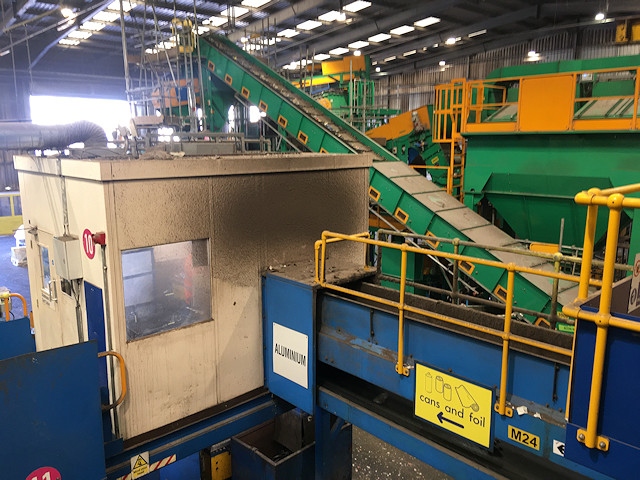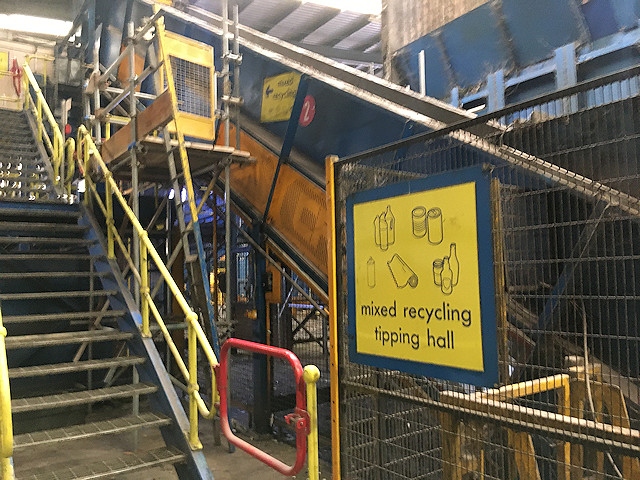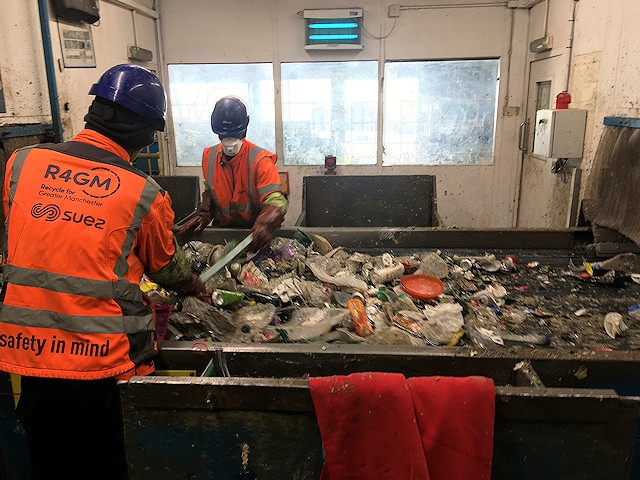What happens to your recycling, top tips and the bizarre things workers find
Date published: 25 October 2022

The Materials Recovery Facility (MRF) at Longley Lane, Manchester
A man clad in high-vis, headphones and a hard hat rushes past as the alarm goes off, gesturing with his hands and neck to colleagues below him to cut it.
The sound of glass smashing has ceased and the crushed crystals have stopped climbing up the conveyor belt – but the floor still shakes furiously.
“Oh no! It might be about to go off,” Alison says. “It’s a big problem if it stops.”
It’s a regular day for workers at Longley Lane who separate all of the rubbish which ends up in mixed recycling bins from most Greater Manchester homes.
Located at an industrial estate in Sharston, the Materials Recovery Facility (MRF) is the only one in the city-region, serving all boroughs but Wigan.
The South Manchester site is capable of processing 90,000 tonnes a year.
It smells and in the summer it becomes infested with flies – but the way it organises each item using state-of-the-art technology is a thing of beauty.
The facility operates almost 24-hours-a-day except for three half-hour shift breaks each day, and on Mondays when the MRF is closed for maintenance.
Lasers, air jets and magnetising machines identify and separate the materials while staff swiftly handpick the incorrect items which may have been missed.
But the machines aren’t perfect and can’t identify all of the things put in the incorrect bin – and big bulky items can contribute to blockages building up.
In Greater Manchester, we currently recycle less than half of our rubbish.
Almost 14% of the rubbish that arrives at the MRF is not recycled due to ‘contamination’ which can mean a whole wagon load of perfectly good recycling goes to landfill because it containts too many of the wrong items.
And even when the right things are put in mixed recycling bins, leaving lids on, not washing out bottles and putting items in bags can confuse the machines.
Contamination is the biggest barrier to raising the recycling rate – currently 48.5% – which would be good for the environment and councils’ coffers.
Once items are separated, they are sold – and they can go for quite a tidy sum.
The money made from selling sought-after materials helps pay for the process and frees up funding for frontline services from being spent on waste disposal.
So what can we do to help?
For national Recycle Week, the Local Democracy Reporting Service visited the site where all the rubbish in Greater Manchester’s mixed recycling bins ends up to find out what happens to it and how regular people can recycle better.
What happens to your recycling
After our mixed recycling bins are collected, their contents are dropped off at sites across Greater Manchester before being delivered to Longley Lane.
Barcoded trucks bring the loads in through a weighbridge which tracks how much rubbish has come from each borough – and how much is recyclable.
The mixed recycling is then taken to the MRF where it is all separated.
Alison Fare, who is an education and behaviour change officer on Greater Manchester’s waste and resources team, regularly runs tours of the site.
“People are the sorters,” she tells visitors. “But we’re the separators.”
In the reception room, staff sample each load to check for contamination.
Last year, 2,498 tonnes of rubbish was rejected at this stage which is a small proportion of the total mixed recycling taken to the MRF, but still significant.
Rejected loads are taken to the mechanical treatment and reception facility, before travelling by rail to Runcorn to be burnt along with other general waste.
If the rubbish is not rejected, it goes up a conveyor belt to the presort carbon where two workers handpick the big bulky items which should not be there.
Shoes, a football and a tape measure are picked out during our tour and Alison says plastic tubs – which cannot be recycled – are often spotted by staff too.

The rubbish then moves through the glass breaker where rollers smash the glass into pieces small enough to fall through holes and the rest continues.
Glass cleaning equipment removes labels and plastic, but lids are an issue.
Leaving lids on jars or putting loose bottle caps in mixed recycling bins causes contamination because they fall through these holes with the broken glass.
A magnet picks out the metal, but plastic that end up in this pile is a problem.
“Lids are a big problem,” Alison says.
“We don’t ask people to take the packaging off, but it would help if they take the lids off and put them in general waste.”
Later down the line, we meet ‘Big Eddy’, the name by which workers at the MRF affectionately refer to the magical machine that separates aluminium.
The Eddy Current temporarily magnetises aluminium and then repels it, while the rest of the items – mostly plastic – continues travelling on a converyor belt.
The cans are crushed by the candenser, baled into ‘biscuits’ and stacked on pallets before being taken away to be sold on the lucrative metal market.
Coloured and clear plastics are separated at the next stage where one set of lasers identifies opaque items and an air jet blows them aside, before the next set of lasers identifies transparent items which are blown away to another pile.
The only plastic that Greater Manchester currently recycles is bottles – but that does not stop residents putting packaging, pots, tubs and trays in too.
“The problem is the clear plastic tubs and trays will be blown in with the clear bottles,” Alison explained, “and “yoghurt pots will go with the opaque bottles.”
Another thing that can confuses the lasers is leaving liquids and foods in clear bottles which deceives the machines into treating them as coloured plastics.
Not emptying and rinsing bottles, jars and cans before putting them in our recycling bins also contributes to the nasty odours which linger in the MRF.
Food accumulates in certain spots, requiring regular deep cleans, Alison says.
A final quality control check is carried out by two more handpickers with the plastics now separated into clear, coloured and mixed, each varying in value.
Before they’re baled, labels are sucked off and taken to general waste before the plastic gets blasted by air up tubes, down to the machine that bales them.
The glass, which fell through the rollers at the first stage, is taken to the bin-der, a cleaning device which shakes the glass into two different size pieces.
Crushed glass is tipped over a concrete wall, while bigger pieces go to the zig zag chamber, where any labels left on are knocked off, before being collected.
The whole process is supposed to be timed to perfection with contractors primed to collect bales of separated items as they reach the desired tonnage.
But even after all of this, the bales are still contaminated by incorrect items.

The bizarre things workers find
During our tour, staff spotted a football, children’s toys and a sander at the presort cabin which they picked out as all of the rubbish rushed past at pace.
Tangled up cables get caught on the conveyor belt and a blockage begins to build before an alarm goes off and a supervisor tells staff to stop the machine.
These big and bulky items can cause the whole process to grind to a halt, but armed with their heavy-duty gloves, the handpickers try to keep things going.
“We get all sorts of stuff,” Alison says.
“We’ve had crowbars, the toilet seat was a big one last week and a lot of tubs.”
Later down the line, we see old shoes, a tape measure and a broadband router.
There’s a collection of scrap metal near the candenser, all of which should have been taken to the tip, including a chunky kitchen kettle, pots and pans.
Nothing surprises workers at the MRF anymore, but they do spot new trends.
One such trend they’ve noticed, is nitrous oxide canisters, sold as whipped cream chargers, but used for laughing gas balloons, are becoming bigger.
Sometimes called ‘hippie crack’, the illegal psychoactive substance is sold in canisters which are often – incorrectly – disposed of in mixed recycling bins.
“It’s good that they are putting them in the recycling and not just littering the countryside,” Alison says, “but they really need to take them to the tip.”
Putting the wrong types of plastic in the mixed recycling bin is also a problem.
The only kind of plastic that is collected for recycling in Greater Manchester currently is bottles, including shampoo, shower gel, and cleaning bottles.
This is because the plastics they are made from are a high-grade plastic and there are well-established sustainable markets to sell this type of material to.
Other types of plastic packaging, such as pots, tubs and trays, are made up of a wider range of polymers and colours, the markets for which are developing.
For that reason, other plastics are collected in the general waste bin which is sent by rail to a plant in Runcorn where it is burned to generate electricity.
Alison recommends thinking about the item, rather than just the material.
“We don’t take all plastic,” she said.
“We don’t take all glass – we don’t want Pyrex or light bulbs.
“Just because we take aluminium and steel doesn’t mean we take any metal.”
Another problem occurs when people put their recycling in bags because this makes it impossible for the MRF machines to identify and seperate the items.
But Alison says the most contaminated recycling is paper and cardboard which is collected in a separate bin and taken elsewhere to be recycled.
Aside from people leaving food in pizza boxes or other takeaway containers, dirty nappies and sanitary towels are sometimes dumped in these bins too.
Bury councillor Alan Quinn, who chairs Greater Manchester’s waste and recycling committee, says some incorrect items create safety hazards.
Disposing of batteries in any household waste or recycling bin is dangerous.
“If you expose lithium to oxygen, it bursts into flames,” he said.
“The workforce is really well trained. They know what to do.
“But people should take batteries to the tip or their supermarkets.”
Top tips – and why they matter
Councillor Quinn says Greater Manchester has a ‘great system’ and is years ahead of some other waste authorities – but the recycling rates need to increase.
In the context of an environmental crisis, he says, recycling is important.
“It’s good for the environment and I think people feel good recycling,” he said.
“They’re doing their bit.”
So how can you do your bit? Here are 15 top tips:
- Plastic shampoo, shower gel and cleaning bottles can be recycled, but other types of plastic packaging, such a pots, tubs and tray go in general waste
- Remove lids and put them in general waste – they come off during the sorting process and can get mixed up in the glass container causing contamination
- Empty and rinse bottles, jars and tins, but there’s no need to remove labels as these are removed when they’re recycled – leaving liquid in a clear bottle can trick the lasers into thinking its opaque, and leaving food in cans just smells!
- You can recycle pizza boxes and aluminium foil, but remove food from it or else the load will be contaminated – but a little bit of grease or residue is okay!
- Smashed bottles or jars can be recycled, but it’s better if the glass in the recycling bin is not broken – a broken drinking glass goes in general waste
- Never pour oil down the drain – put it in a container and in general waste
- Take scrap metal – including laughing gas cannisters – to the tip
- There’s no need to rip off the windows from envelopes as they are quite small nor do you need to cut out the plastic from cartons – just take the lid off
- Remove tape from cardboard boxes if you can, but it’s not big problem
- Don’t put your recycling in bags – that stops the machines separating stuff
- Lightbulbs go in general waste bins, not mixed recycling – but filament and fluorescent bulbs have gases which must be extracted so take these to the tip
- Aerosols should go in mixed recycling bins – no need to remove the nozzle
- Bottles: glass is infinitely recyclable, but plastic is worth more – recycle both!
- If you live in a flat with no access to any food waste facilities, you can ask your building management company for some. Or speak to the council
- You don’t need a car to go to a household waste and recycling centre – bicycles are allowed! But you cannot go on foot because of health and safety rules
For more information, visit recycleforgreatermanchester.com
Joseph Timan, Local Democracy Reporter
Do you have a story for us?
Let us know by emailing news@rochdaleonline.co.uk
All contact will be treated in confidence.
Most Viewed News Stories
- 1Snow and ice warning for Rochdale & Greater Manchester
- 2Century-old town centre pub could soon become apartments
- 3Former Nutters restaurant will be transformed into an Albert’s
- 4Detectives make an arrest and appeal for more information following fatal stabbing in Rochdale
- 5Suspected shoplifter arrested with public’s help
To contact the Rochdale Online news desk, email news@rochdaleonline.co.uk or visit our news submission page.
To get the latest news on your desktop or mobile, follow Rochdale Online on Twitter and Facebook.


